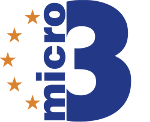- Home
- About
- OSD
- MyOSD
- Partners
- Work Packages
- WP 1Management & Coordination
- WP 2 (OSD)Ocean Sampling Day
- WP 3Oceanography & Environmental Data
- WP 4Standards and Interoperability
- WP 5Bioinformatics & Data Integration
- WP 6Exploring Ecosystems Biology
- WP 7Function and Biotechnology
- WP 8Intellectual Property (IP) Management for Marine Bioprospecting
- WP 9Dissemination & Outreach
- Public DeliverablesAll Micro B3's public deliverables
- Meetings
- Workshops
- Third Micro B3 Industry Expert Workshop
- Micro B3 Industry Expert Workshop
- Micro B3/OSD Analysis Workshop
- Micro B3 Stakeholder Workshop
- Micro B3 Summer School in Crete 2014
- Marine Metagenomics Bioinformatics
- Micro B3 Industry expert workshop
- EU-US Training 2013
- Micro B3 Statistics Training 2013
- MG4U Bioinformatics Training 2013
- Bioinformatics Training 2012
- EU-US Training 2012
The Sea as a Gene Pool
The oceans are full of bacteria. Outwardly, they all look much the same, but there are many
different species living a variety of ways of life. This has led Hanno Teeling, Bernhard Fuchs and
Frank Oliver Glöckner from the Max Planck Institute for Marine Microbiology in Bremen to
analyze bacterial diversity in the oceans with the aid of metagenomics. To do this, they first
throw the whole bacterial genome into one pot, then decode the DNA molecules and sort the
genetic mix back into individual bacterial groups.
Die Ozeane sind voller Bakterien. Äußerlich sehen diese nahezu gleich aus, doch es gibt viele
verschiedene Arten mit unterschiedlichen Lebensweisen. Daher analysieren Hanno Teeling,
Bernhard Fuchs und Frank Oliver Glöckner vom Max-Planck-Institut für marine
Mikrobiologie in Bremen die Bakterienvielfalt in den Ozeanen mithilfe der Metagenomik.
Dabei werfen sie zunächst das gesamte bakterielle Erbgut in einen Topf, entschlüsseln die
DNA-Moleküle und ordnen den Genmix dann wieder einzelnen Bakteriengruppen zu.


